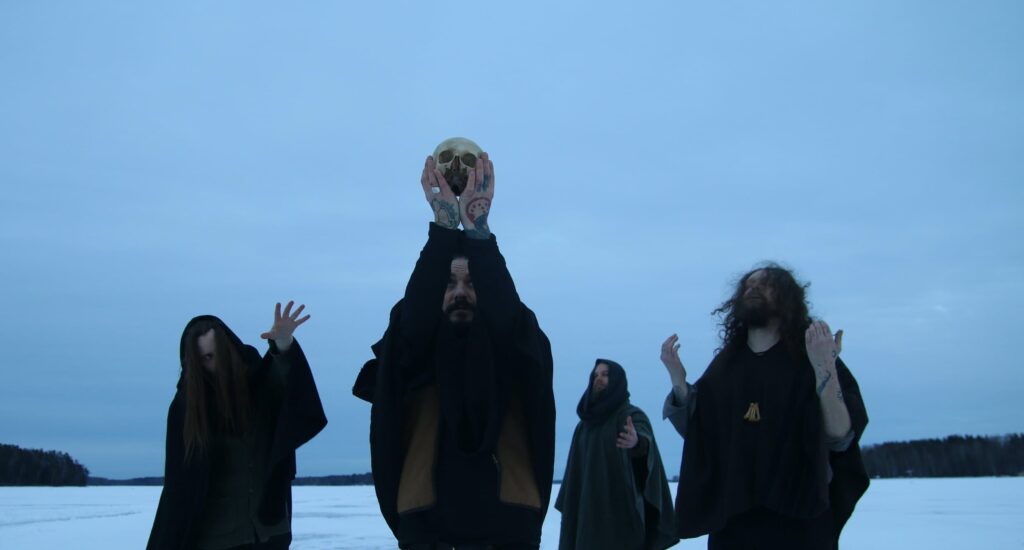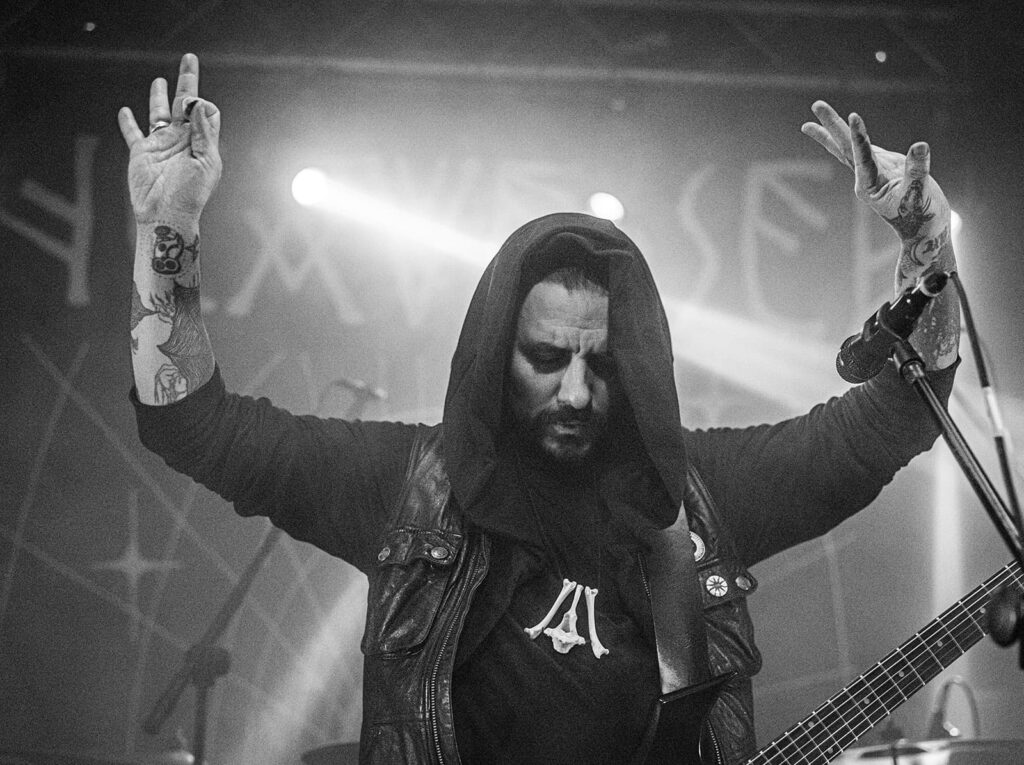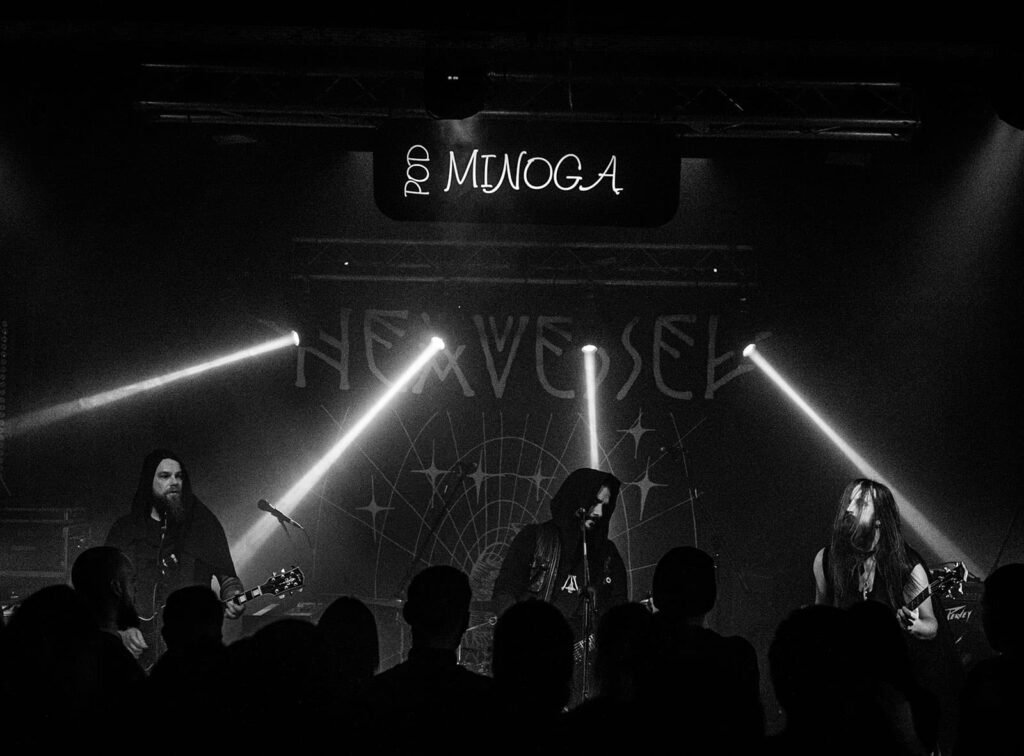
My conversation with Mat McNerney, mostly recognized for his work with Hexvessel, Beastmilk and Grave Pleasures has been launched without any appointment, shortly after I asked him about a possible interview after a Hexvessel gig in Poznań, Poland. Therefore I encourage you to take on a black metal journey with me and eloquent, talkative and extremely courteous Kvohst.
Adam Lonkwic

Adam Lonkwic.: In a couple of interviews with you I’ve read that this record, Polar Veil, is what you think black metal should be, what you feel black metal is. So I wanted to ask you – what do you think about the current black metal scene? Of course it’s in much different form than in the 90s, but what is your exact opinion?
Mat “Kvohst” McNerney: I think that it’s a case of it becoming a very known and recognised art form, there’s a lot of people practising it, but I think that the fact that there’s so much of it on quite a commercial scale, that what is lost is a central message for me. So I think the feeling and the spirit of it is kind of lost on the commercial end. I’ve felt like that now there’s a room for my expression of it, whereas in times gone by I just didn’t feel that there was a room for expressing that where it would be felt. I think that now it feels like we’re sort of tapping into something that I think is underappreciated, undervalued – the spirit of it, the feeling. Because for me – it is a feeling – for me it’s not a genre, it’s not really a label, it’s a feeling and it’s a way of life. And it’s a dedication that you give yourself to and that you would die for. So it’s very, very serious, I would say, like a religion, more than the genre of music. So I don’t think someone can pick up a guitar and say “Oh, I’m gonna buy the right pedals and make some black metal now”, I don’t think that’s possible, I think you have to live it. It’s a bit like jazz, if you want to play jazz you have to be jazz, you have to understand what jazz and its essence is. So I think the older jazz players would probably tell you -”Come here every night, and get into the spirit of jazz, understand the world of it, the meaning of dedicating yourself to the music.” For me that’s similar with black metal, it’s not really something you can just decide to do, but I think there’s a lot of people who do that. That’s also fine because it’s bringing a lot of new people to the genre, but there’s a lot of room for people going back to where it started. I’m trying to understand what the true essence of this music is and for me it’s nature mysticism. That’s the thing that really sparked my fire with the Feeble Screams From Forests Unknown and Under a Funeral Moon, you know, the album covers and the whole sensibility of it. And I think that it’s always been there in Hexvessel, so now we’re going back and expressing it.
A. L.: I wanted to ask you about this commercial angle of black metal you mentioned. It reminds me of statements delivered by Polish black metal musician – Nihil from Furia – who stated that black metal is going highly commercial, he mentioned (before the Lords of Chaos film’s premiere) that there’s even a hollywood movie being produced, but still – it’s black metal – I think no black metal musician is going to make a shitload of cash, don’t you think?
M. M.: I think you can say a burger’s still a burger if you buy it from McDonalds, it certainly is a burger, and you can enjoy it for what it is, if you understand what it is. But if you really want to get deeper then you’ll probably go to a connoisseur who makes a real burger. So you can think about it like that if you want to, that it’s just fast food and it’s fine, I think it serves its purpose. Something for me that I really respect and admire is that someone like Nergal can take black metal to such a high profile, but still retain the same spirit of aggression, protest and fighting against the government – standing for those things that we grew up thinking we would never have the chance to fight for, that’s really beautiful. I think it’s great, being able to see people in a stadium chanting their songs, that’s amazing and it’s brilliant, and I would much rather prefer to see that than an Arch Enemy or something like that, I really enjoy what they’re doing. So I think there’s a place for everything, but I think that what’s missing is just this understanding of the spiritual side of black metal. It’s kind of underrepresented, I think. And that’s where I saw this album fitting, I saw it’s a good time to have Polar Veil come out. It’s not my protest album, it’s just more like “Okay, you’re listening to that? Well, this is what I feel about it”. It’s just the right time – but it’s also a right time for me in my age, because I’m 45 now, and I think that you get to a point where you’ve had your experimentalism, you’ve done all the things you wanted to do and then you go back to who you are at the fundamental level. I’m just a black metal guy at my heart, that’s who I am, and I’m comfortable with that now. I think for a time I was just searching for who I was. Some albums I don’t see that well, but I’m not ashamed of them, I just feel like it was just me trying to discover where I could go musically and I’m glad I did that. I’m glad I didn’t go straight out of Dødheimsgard and make a black metal band, because I don’t think I would’ve understood how to do it right. Now I’ve got to this point where I can say “Okay, now I know how to do my version of black metal”, but it took, I don’t know, 10 years or something like that to figure that out, hahaha.
A. L.: Yeah, also Dødheimsgard was actually sort of an experimental band too, like the album Supervillain Outcast where you did the vocals – it’s not a straightforward black metal album.
M. M.: Yeah, definitely.
A. L.: In Hexvessel you’re usually exploring, let’s say, psychedelic folk genre, but it has always had a black metal vibe. I also love your psychedelic, catchy rock like When We Are Death album or in Beastmilk/Grave Pleasures, do you think you’re gonna do more catchy stuff?
M. M.: Yeah, but I think Polar Veil is kinda catchy, it still retains a lot of signatures of my songwriting, it still got choruses-verses structure. I think it’s just me getting away from where I was at those times, and I don’t think I’ll ever forget how to make songs – I’m a songwriter, I don’t make experimental music with a lot of instrumental parts – so I think it’s still there, you can really tell the essence of who I am. I like the reviews where people say that this album is the culmination of all I’m doing, you can hear post-punk, you can hear the black metal thing, you can hear the folk, you can hear the early Hexvessel stuff – it’s like everything coming together. It’s difficult in 45 minutes to really put all of your life into one record, but I think this album is kind of on a way to that, there’s a lot of nods to my past and in a right way – it’s not random – I think of it as well constructed. I’m proud of it like that. I’m not ashamed of an album like When We Are Death, but I think I tried to do too many things in one record. That’s a maturity thing, you get older and you realize a record should be what it is – it has to have a sense of itself. When We Are Death is an interesting record in that sense but it’s got a lot of ideas. There are some songs I really like, some that I think I should’ve pulled back with something but you learn as you go. I think it’s a great thing, but when I listen to the artists I can forgive them for the middle period records and then they come back, they suddenly find fire and then they are alive again, that’s something I really admire, I think it’s the same in this case.
A. L.: I saw you last time when you were supporting Killing Joke with Grave Pleasures. Do you think decadence and political or social dismay (like cold war for the Killing Joke) can have the same effect for creating music or art in general today?
M. M.: I think things have changed in younger people, they realized they have the power to speak up and the protest was a little bit different in the 80s. It wasn’t so easy to protest against the government, you were smashed down, so I think the music has less of an important role to play, because music then was a way to express the things you couldn’t express in public – but now people can express themselves in public a little bit easier and it’s even kind of encouraged. So maybe music has lost some of that value, but for me and I think for people who get something out of it, it hasn’t. But I think on a wider scale, commercial scale it has lost that, so as an art form it feels right now music is underappreciated. But I don’t think that has to be the way all the time, technological changes can have its ups and downs. If you think about preclassical music – it wasn’t thought of the same way as it is today. So I think music can evolve and its importance can change. Maybe right now is not the best time for music, but I think it can still be very important. Maybe we’re simply looking in the wrong places – underground music fans feel that their music is very important – but I think also overground music became more avant-garde. You have people like Taylor Swift or Lady Gaga being quite extreme with some of the stuff they do.
A. L.: Yeah, especially in hip hop music.
M. M.: Yeah, they’ve kinda embraced the underground. So maybe this lessens the need for extremists in music, but I don’t think it takes anything from the spirit. For us it’s more about the passion and the feeling, for me I don’t want to get political because I don’t think that’s where I find my calling in music.
A. L.: I trace this lessening of importance even to minor stuff like the Spotify algorithms. I’ve been a big music fan since I was a kid and sometimes I find myself not listening to the lyrics, just the overall melody. Next Question: I always heard black metal in every other band that you have, whether it’s post punk or psychedelic folk. Can you ever release yourself from black metal, or do you even want to?
M. M.: I don’t think it’s even a consideration, you get to the point where you know who you are and you’re comfortable with it, it’s part of my story, whether I like it or not. It’s not something I can edit out, and no matter what I’ll do or experiment with music, the black metal people came with me, because they can hear it. You made the point about the lyrics – you don’t understand the lyrics and you listen to the music – but you still get a sense of what the music is about. I remember a song by Vladimir Vysotsky, he’s a Russian singer and I was telling my friend “This song is so sad, he obviously lost his lover”. And he said “It’s interesting you think about it like that, because the lyrics are actually about soldiers who died in the war”, but the sadness was so deep that you get this sense of broken heart, it took another layer, but it’s kinda like that when you think about your understanding of who you are musically, and your interpretation of the sound. When I was experimenting on When We Are Death because we were playing what we thought was psychedelic rock, quite happy, not very nihilistic, there were some really positive feelings in the music, but we still had a black metal audience, we still had people in black metal shirts coming to see us play. We couldn’t understand it, because I was thinking at this point I’ve abandoned that musically, but it’s not true, you cannot abandon it, because people will hear it. They can hear that it’s a black metal guy doing something different – and then I started to appreciate that also. I appreciate the fact that there’s a lot of people that followed me no matter what I’m doing, they’re still interested and so I think it’s also the case of acknowledging that back, thinking “Okay, we’re still together on that journey, let’s think about where we started”.
A. L.: Homeward Polar Spirit got this raw black metal feeling, it also put another question on my mind. For example – there is a Polish band called Wilczyca – and they are deliberately worsening the quality of their records in order to make it sound more black metal. “Polar Veil” isn’t like that – it is black metal, but produced in high quality, therefore I wanted to ask you about your opinion on such ideas.
M. M.: I was walking through the street in Helsinki and I walked past the music store. I saw that they have the first amplifier that I had when I was a kid, it was a Peavey Bandit. I was like “Oh my God, that’s the very first amplifier I had!”, and I hated it as a kid! I didn’t want that, I wanted a Marshall stack, but I got stock with whatever I could afford, so I had to carry it around – and it was really heavy – I really fucking hated that amplifier. But I saw that in Helsinki and I wanted to have that just for the feeling of being a kid again. I got it and I started messing with it, then I got the feeling of playing those riffs I played as a kid and making some new things, so I got the spirit back. I guess it’s just the sound that you identify with the feeling – so if you get the feeling from a sound, why not? I don’t think of things as worse or better, because I listen to all kinds of levels of music – I listen to things made in a bedroom on a tape cassette, I listen to the things made in a professional studio. We didn’t use anything fancy for our record – it wasn’t hi-fi. It was recorded in my barn, it was recorded very rough, the drums had very old skins. But it wasn’t the sense of “Let’s get this old stuff!”, it was just what gave the feeling. I wanted the drums’ sound like Mental Funeral because that was the most mystifying sound to me as a kid. We bought Mental Funeral, we put it on and there’s something really unearthly about the sound – it’s sick, it’s weird, it’s horrible – it’s just got the charm you feel can never be replicated again. Everybody searches for that when they make music, so I don’t look down on anybody else for their choices in the production or anything. It’s just whatever gives the feeling and I really don’t like talking about equipment or gear, because for me it’s not important, so that answers the question I think – the gear isn’t important, the feeling is important.

A. L.: Every record I’ve heard you on got a stylistical change. Do you actually plan to make another stylistical change on the next Hexvessel record or is it spontaneous?
M. M.: I never wanted to be a person who does things in different styles, I never wanted to be an artist like that, but that’s kind of how it ended up. I’m proud of that. I like artists who are like that. For example I enjoy Kris Garm from Ulver, the fact that he does a lot of different stuff in music. This is what I am as an artist, I’m not the guy who stays in one band a long time and produces a lot of the same albums and makes it commercially. I’m an underground, avant-garde guy who does different records in different styles. I think with Hexvessel it’s the case that it’s my long term project, it’s my solo work. Now I think we’re really on to something – it feels like a new beginning. We got a commission for Roadburn for next year and I think that performance will be basically the next Hexvessel record, but performed in a way that you haven’t seen before. So it’s the first time people will hear the new material. It’s kind of a similar beginning, but something even more epic, with more musicians and more things happening. That’s the future there, next April.